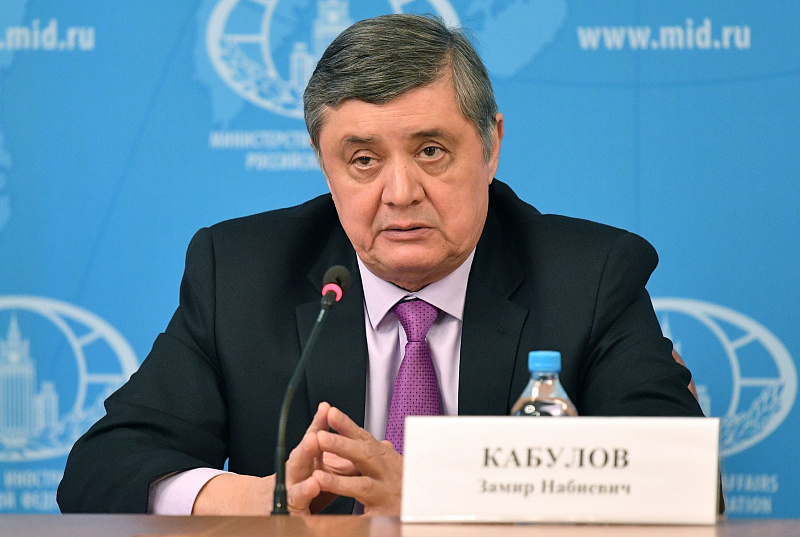What Benefits Would India Derive by Joining the Extended Troika on Afghanistan?
In
Log in if you are already registered
Zamir Kabulov, Russian Special Presidential Envoy to Afghanistan, has recently expressed hope that India would participate in the Extended Troika of itself, China, Pakistan and the U.S. but clarified that New Delhi would first have to obtain influence over both sides of the conflict. According to TASS, his exact words were as follows: “India’s future efforts, in a more expanded format will only be welcomed. This expanded format will involve Afghanistan’s post-conflict development. Here, India’s clout and its role are rather significant. The format of the ‘Extended Troika’ with the participation of Russia, the US, China and Pakistan is convened exclusively to facilitate the launch of the intra-Afghan talks leading to national accord. Only countries that have an unequivocal influence on both sides [of the conflict] participate.”

Source: Sputnik
Therein lies the crux of the problem since India is opposed in principle to doing anything that could legitimize the Taliban, which it regards as a terrorist group just like the Extended Troika’s members do despite the latter four still pragmatically engaging it in the name of peace. This comes in spite of reports that India has already sought to establish contact with the group, something New Delhi officially denies. The South Asian state is, therefore, a partisan player in the Afghan Civil War since it only supports Kabul. This disqualifies it from participating in the Extended Troika in any meaningful way, which is arguably to the detriment of its national interests despite many Indian experts feeling differently. The longer India remains outside of the Extended Troika by refusing to talk to the Taliban, the more it will sideline itself from the Afghan peace process and all that comes after.
Objectively speaking, India’s principled position inadvertently resulted in it ceding influence over this process to Pakistan. The unexpected outcome is that Islamabad is now equally important to Moscow and Washington, as proven by Russian Foreign Minister Lavrov’s enthusiastic endorsement of Central Asia-South Asia connectivity at a topical conference in Tashkent in mid-July and the U.S. establishing a new quadrilateral framework between itself, Pakistan, Afghanistan and Uzbekistan that very same week. These developments might have been strategically inevitable in hindsight but were arguably accelerated by India losing influence in Afghanistan due to its anti-Taliban policies. Had India engaged with the Taliban earlier and thus officially participated in the Moscow peace process as an equal member, everything might not have developed as fast as it did.
It would be wrong to regard events through the zero-sum perspective since Russia’s and the U.S.’ growing strategic ties with Pakistan do not in and of themselves harm India’s national interests. Both great powers are increasingly relying on Islamabad’s influence over the Afghan peace process and hope to take advantage of its geostrategic position in order to advance their regional connectivity goals. The trilateral Pakistan-Afghanistan-Uzbekistan (PAKAFUZ) railway that was agreed upon in February is the point of convergence between these three countries. Russia wants to use it to finally fulfill its centuries-long goal of reaching the Indian Ocean while the U.S. aims to utilize this platform for expanding its economic influence into the post-withdrawal Afghanistan and the Central Asian Republics (CARs).
What India urgently needs is a pragmatic means to defend its economic interests in Afghanistan and subsequently expand them in the context of rapidly changing circumstances there, particularly the Taliban’s lightning-fast military offensive as well as the world’s cautious welcoming of the group into the international community. By retaining its principled policy of refusing to talk to the Taliban, India is counterproductively worsening its inadvertently self-imposed isolation over these processes. With time, this could lead to it losing its economic influence over Afghanistan, ruining the strategic opportunities that it hoped to create through such investments. The only realistic solution is to talk to the Taliban, perhaps mediated by their shared Russian partners, to join the Extended Troika as an equal partner.
The benefits inherent to this policy proposal outweigh the costs. In terms of positive dividends, India would show the world that its foreign policy is capable of adapting to the rapidly changing circumstances flexibly and pragmatically—just like all great powers should be able to do. It will obtain a seat at the peace talks table and hopefully succeed in convincing the Taliban not to vindictively threaten its Afghan investments. India would also be able to consider the means through which its companies in the country could take advantage of PAKAFUZ to expand their economic influence in the CARs. By gradually transitioning the prism through which it formulates its Afghan policy from geopolitics to geo-economics, New Delhi would also be embracing one of the top global trends of the 21st century.
The only costs that this entails are short-term reputational ones, mostly relevant when it comes to domestic politics. The Hindu nationalist BJP might provoke criticism from some of its most passionate constituents for talking to the Taliban after years of insisting that it is an irredeemable terrorist group that must be isolated at all costs. It is understandable that some of its supports would therefore be incensed, but India’s perception managers can ideally get to work explaining to them how this policy shift actually works towards their country’s long-term national interests through the manner that was described earlier on. Some will still be against it, but expected that the most patriotic ones would begrudgingly understand even if they continue to disagree out of principle. What should be most important to all of them is making India relevant in Afghanistan again.
This is the vision that Mr. Kabulov wants to see. Russia is India’s comprehensive and privileged strategic partner and only wants the best for its South Asian ally. Moscow is actively expanding its 21st-century Eurasian-wide balancing act into the geostrategic Central Asia-South Asia space with a specific focus on post-withdrawal Afghanistan. The Kremlin’s policy entails India retaining its economic influence there upon entering into talks with the Taliban, joining the Extended Troika and becoming an equal partner in determining the outcome of the ongoing Afghan peace process. Russia regards India as an irreplaceable balancing force in this trans-regional space, especially in the economic sense, but its partner can’t fulfill this envisioned role without first talking to the Taliban and replacing its zero-sum geopolitically driven policies with win-win geo-economic ones.
American Moscow-based political analyst specializing in the relationship between the US strategy in Afro-Eurasia, China's One Belt One Road global vision of New Silk Road connectivity, and Hybrid Warfare
Blog: Andrew Korybko's blog
Rating: 1




